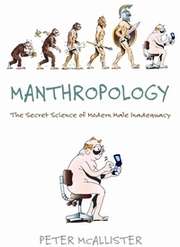October 21, 2009 weblog
Modern men are wimps, according to new book

(PhysOrg.com) -- A new book claims even modern athletes could not run as fast, jump as high, or have been nearly as strong as our predecessors.
The book, Manthropology: The Science of the Inadequate Modern Male, by Australian anthropologist Peter McAllister, describes many examples of the inadequacy of the modern male, calling them as a class, "the sorriest cohort of masculine Homo sapiens to ever walk the planet."
Given spiked running shoes, Indigenous Australians of 20,000 years ago could have beaten today's world record for running 100 and 200 meters. As recently as last century, some Tutsi males in Rwanda could have easily beaten the current high jump world record, and bodybuilders such as Arnold Schwarzenegger would have been no match in an arm wrestle with a Neanderthal woman.
Twenty thousand years ago six male Australian Aborigines chasing prey left footprints in a muddy lake shore that became fossilized. Analysis of the footprints shows one of them was running at 37 kph (23 mph), only 5 kph slower than Usain Bolt was traveling at when he ran the 100 meters in world record time of 9.69 seconds in Beijing last year. But Bolt had been the recipient of modern training, and had the benefits of spiked running shoes and a rubberized track, whereas the Aboriginal man was running barefoot in soft mud. Given the modern conditions, the man, dubbed T8, could have reached speeds of 45 kph, according to McAllister.
McAllister also presents as evidence of his thesis photographs taken by a German anthropologist early in the twentieth century. The photographs showed Tutsi initiation ceremonies in which young men had to jump their own height in order to be accepted as men. Some of them jumped as high as 2.52 meters, which is higher than the current world record of 2.45 meters.
McAllister, interviewed in his temporary residence in Cambridge, UK, also said women of the extinct hominids such as the Neanderthals carried around 10 percent more muscle than modern European men, and with training could have reached 90 percent of the bulk of Arnold Schwarzenegger at his physical prime. Her shorter lower arm would have given her a great advantage in an arm wrestle, and she could easily have slammed his arm to the table.
Other examples in the book are rowers of the massive trireme warships in ancient Athens who far exceeded the capabilities of modern rowers, Roman soldiers who completed the equivalent of one and a half marathons a day, carrying equipment weighing half their body weight, and Australian Aborigines who could throw a spear over 10 meters further than the current javelin world record.
McAllister attributes the decline to the more sedentary lifestyle humans have lived since the industrial revolution, which has made modern people less robust than before since machines do so much of the work. The fact that we are constantly improving and breaking athletic records is because they are only in comparison to the performances in recent decades. If you compare today's athleticism with that of humans much further back we see a real decline.
According to McAllister humans have lost 40 percent of the shafts of the long bones because they are no longer subjected to the kind of muscular loads that were normal before the industrial revolution. Even our elite athletes are not exposed to anywhere near the challenges and loads that were part of everyday life for pre-industrial people.
The Cro-Magnons, the first anatomically modern Europeans, living around 30-40,000 years ago, were impressively tall (many over 6 feet 6 inches), strong, fit, and with larger brains than humans of today. They had an active lifestyle and an abundant and balanced diet of meats and vegetables.
The advent of agriculture (described by anthropologist Jared Diamond as the worst mistake in history) meant a steady supply of food, but it also meant our diet became lower in quality, less varied and contained fewer nutrients. The result was that we became smaller and weaker, only regaining size and strength in the last century or so after improvements in sanitation and the development of medicines such as antibiotics.
The good news from the findings described in the book is that the human body is plastic, and can change over generations. Each individual body can also change over much shorter periods of time. With a good balanced and varied diet and with plenty of exercise, there is plenty of scope for improvement in almost all of us.
More information: More info about the book can be found here.
© 2009 PhysOrg.com
















